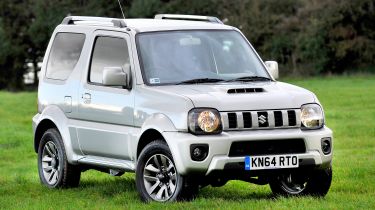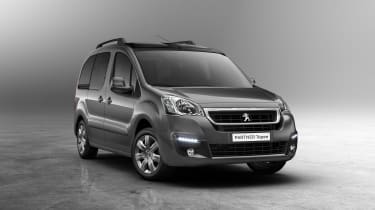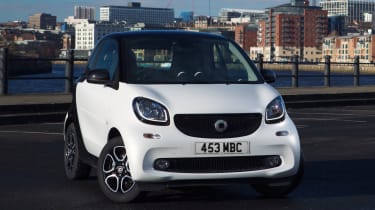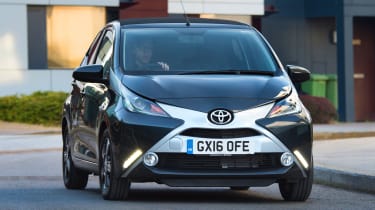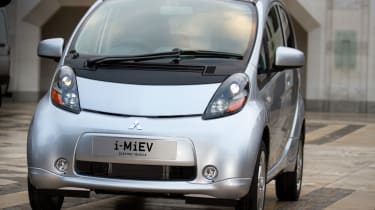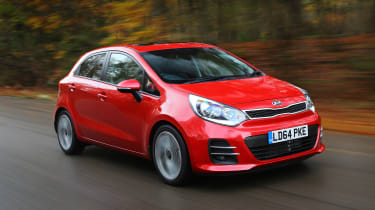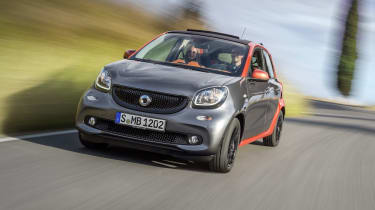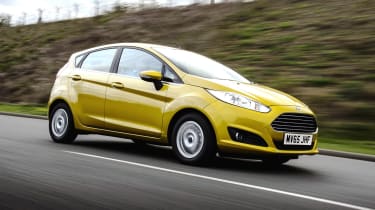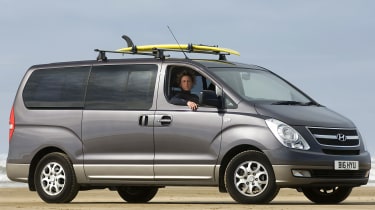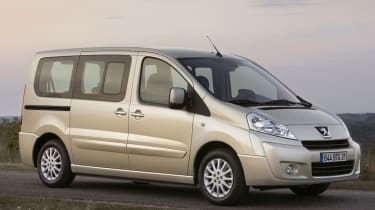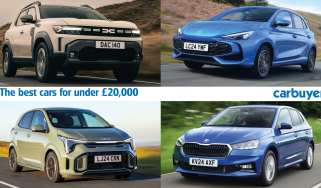Top 10: Britain’s slowest cars
If you thought the days of pedestrian acceleration times were over, think again. Here’s our list of the 10 slowest cars available today.
While it may not be much of an accolade, being one of the slowest-accelerating cars available isn’t necessarily a bad thing, either. Slower cars tend to be cheaper to insure – a boon for new drivers – and unintentionally breaking the speed limit is trickier, too, so you’re less likely to come-a-cropper with a copper.
However, you need to be careful when accelerating out of junctions if you’re not used to something with quite such leisurely performance as the cars in our list. You’ll need to wait for a bigger gap than you normally would.
Here are the cars with the slowest 0-62mph acceleration times currently on sale in the UK.
Citroen Berlingo Multispace/Peugeot Partner Tepee BlueHDi 75 – 15.1s
These cars started life as vans and, while they’re practical, they’re not particularly exciting to drive – especially with only 74bhp to play with. Despite this miserly power output and the significant amount of weight they’re dragging about, they’re actually some of the faster (or should we say less slow?) cars on this list.
Smart ForTwo 71hp passion automatic – 15.5s
The little city car has never been quick, but with just a 70bhp engine and a power-sapping automatic gearbox, this particular model is one slow car. To be fair to the little Smart, it wasn’t designed to zoom down country lanes or cruise the motorway. Rather, it’s meant to provide agile, simple and efficient urban transport. Still, a 0-62mph time of 15.5 seconds gets it a place on this list.
Toyota Aygo 1.0-litre automatic – 15.5s
Eventually, someone will work out that the combination of a small car with a small, not particularly powerful engine and an automatic gearbox doesn’t make for a very inspiring result. As with the Smart described above, the Aygo was never intended to be a performance car, or even to perform particularly well outside of town, but its 15.5-second 0-62mph is pretty conservative even in that context.
Mitsubishi i-Miev/Peugeot iOn/Citroen C-Zero – 15.9s
There was a time when not all electric cars were performance monsters like the Tesla Model S. These three are essentially the same car, but with different badges, and have been around since 2009. When compared to the Tesla, they show how far battery and electric vehicle technologies have advanced in a relatively short period of time. These cars, were, however, groundbreaking in their own way, being the first mass-produced electric cars you could buy. With a range of around 80 miles, they actually make sense as city-only commuter cars – or rather they would do if they didn’t cost around £17,000.
Kia Rio 1.1 CRDi EcoDynamics – 16.1s
At one point this was the most efficient petrol or diesel car on sale, returning around 86mpg and emitting just 86g/km of CO2. This means supremely low running costs, but all the eco-friendliness and penny-pinching came with disadvantages – incredibly tall gearing and a rather lacklustre engine make for a truly glacial acceleration time. With a top speed of 99mph, this Rio can keep up with motorway traffic – it just takes a while to get up to motorway speed in the first place.
Smart ForFour 52kW – 16.9s
Making the same amount of power as the lighter ForTwo mentioned above, the 70bhp Smart ForFour was never going to be a performance car and a 0-62mph time of nigh-on 17 seconds confirms that initial suspicion. Unlike the ForTwo, however, this car has a manual gearbox, so it doesn’t have the excuse of a power-sapping automatic to explain its fairly sluggish performance. On the plus side, it’ll seat four in comfort is a cinch to manoeuvre around a busy city.
Ford Fiesta 60PS 1.25 – 16.9s
As the entry-level version of one of our favourite superminis, the 59bhp Fiesta isn’t a big seller, but it’s cheap to run and, importantly for young drivers, cheap to insure, too. Okay, so a rather wheezy 0-62mph time of 16.9 seconds means it’ll struggle to keep up with even the slowest of traffic. The rather asthmatic 59bhp 1.25-litre petrol engine may not be the strongest engine in the world, but the Fiesta is more practical than some of the cars on this list.
Suzuki Jimny Auto – 17.2s
An old car with an old engine and a truly awful gearbox. Don’t get us wrong, the manual-gearbox Jimny isn’t exactly a speed machine – it does 0-62mph in 14.1 seconds – but the self-shifting transmission adds more than three seconds to that. Ally this to the fact that the Jimny is only available with a weak 1.3-litre petrol engine to power all four wheels – which adds weight – and the result is one seriously slow car. Its top speed of 84mph isn’t particularly impressive, either.
Hyundai i800 136PS – 17.6s
The last few cars on our list are essentially vans that have been modified to become exceptionally large MPVs. The i800 has been designed above all to carry eight people, so performance and dynamic ability were always going to play second fiddle. This is the only version of the car that’s exceptionally slow, though: the automatic version (with 168bhp rather than this model’s 134) completes 0-62mph in a respectable – but still not exactly rapid – 14.4 seconds. It’s incredible to think that a bit less power and a change of gearbox can add more than three seconds to the time.
Peugeot Expert Tepee L1/L2 HDi 98 – 18.5/20.7s
Another van converted into an MPV, with the only difference between these two versions being the extra length of the L2. These are, officially the two slowest-accelerating production cars available in the UK. Both weigh the thick end of two tonnes (more with all seats in use) and a rather mismatched 97bhp diesel engine means performance was never going to be rapid. However, 0-62mph times of 18.5 and 20.7 seconds for the L1 and L2 take the term ‘relaxed’ performance to the extreme. Hugely practical, but not one for speed freaks.
Honourable mention:
Renault Twizy – N/A
The little Renault Twizy gets an honourable mention on this list for a couple of reasons. Firstly, it’s not technically a car – it’s officially a quadricycle – and secondly, it’s not actually capable of travelling at 62mph. That’s not to say it’s incredibly slow, however: it’ll do 0-30mph in a pretty rapid 4.4 seconds and tops out at 50mph. It only has 20bhp, but a weight of just 450kg and instant power delivery from the electric motor means you’ll be able to out-accelerate most things from the traffic lights.
Recommended
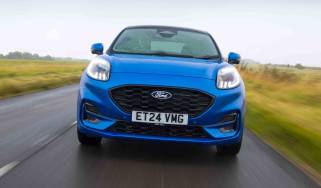
Ford EcoBoost engines: reliability, problems and should you buy one?
Most Popular

Suzuki’s new 10-year warranty is free – here’s how to get it

Omoda E5 targets rivals: now with zero deposit and APR
Tips & advice

Car dashboard warning lights: what does each symbol mean?

Electric car charging stations: public networks, charger types, apps and maps

